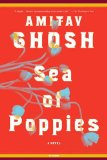No one is immune from genre-bashing. What’s come to be known as historical fiction is one of those genres at which I tend to look askance. I’m guilty of often considering it little more than a costume drama, where the author simply places characters and situations in a historical setting. But it’s also a genre where books come along that remind us why genre blinders aren’t appropriate.
 Amitav Ghosh’s Sea of Poppies is one such novel. It is as intelligently written and highly informative as it is sweeping in scope.
Amitav Ghosh’s Sea of Poppies is one such novel. It is as intelligently written and highly informative as it is sweeping in scope.
Set in 1838, the center of Ghosh’s tale, shortlisted for the 2008 Man Booker Prize, is a slave-trading ship called the Ibis. Because Great Britain abolished its role in the Atlantic slave trade, the ship finds a new calling. It is purchased by the English-born, Calcutta-based merchant Ben Burnham, whose commercial interests include the opium trade. The ship is brought to Calcutta to be refurbished to export opium to China. Because China is seeking to abolish the opium trade, which will lead to the first of the Opium Wars, upon refurbishing the Ibis is pressed into service to transport girmitiya, indentured laborers, to plantations on the island of Mauritius. Thus, while it no longer carries the chains that bound slaves destined for America, it remains a vehicle for trade in human beings.
The ship ultimately becomes the focal point for a wide variety of characters. Deeti, who lives in a poor inland Indian village dependent upon growing opium, sees the ship in a vision. She will eventually end up on it as one of the girmitiya after her husband dies and a low-caste ox cart driver rescues her from being burned on her husband’s funeral pyre. Zachary Reid is the mulatto freedman son of an American slave-owner but whose color doesn’t overtly reveal his black heritage. Hired on the Ibis as a master carpenter for its rebuilding, he rises to the level of second mate on the voyage to Calcutta and attracts the favorable attention of the new owner. Reid is also looked on favorably by the lascar, natives of the Indian Ocean area who manned the European-owned ships, he ends up commanding on the way to Calcutta. Among the others who find themselves aboard the ship as it leaves India for Mauritius are Neel Rattan, an upper caste raja whose mounting debt ends in criminal indenture; Paulette Lambert, who becomes Burnham’s ward after the death of her liberal French father; Jodu, the son of Paulette’s wet-nurse who was raised alongside her before her father’s death and whom she considers almost a brother; and Baboo Nob Kissin, Burnham’s gomusta, who acts as his accountant and aide-de-camp.
Ghosh brings these and many other characters into the tale during the course of three broad parts, titled Land, River and Sea. These sections detail the background of the characters and the differing paths that bring them to the Ibis. Because Sea of Poppies is the first in a planned trilogy, neither we nor the characters arrive at Mauritius but, rather, are left amidst a storm on “the Black Water” (the Indian Ocean) when the book closes. In fact, to some extent, Sea of Poppies could be classified as a classic epic adventure because many of the characters are engaged in the adventure of a lifetime, whether voluntary or involuntary.
Ghosh’s copious detail makes the reader intimately familiar with the characters and their respective cultures and heritage. Not only is Sea of Poppies highly readable, it is particularly impressive in two other respects. One is the pervasive historicity. Ghosh, who spent nearly four years writing the book, provides not only a political history, but an understanding of culture, religion, diversity, the opium trade, heritage and so much more. Even the history averse will learn plenty and enjoy being immersed in history.
The lascar play a key role in the book’s other extraordinary aspect. The book is replete with the pidgin used by the lascar. Yet Ghosh does not merely provide a glossary for reference. Instead, he creates “The Ibis Chrestomathy”, supposedly compiled by Neel Rattan. The lengthy chrestomathy (more than 40 pages in the recently released trade paper edition) is based on at least two actual reference works and provides not only an understanding of the words, but often their etymology and usages.
Ghosh’s skill and attention to detail make Sea of Poppies an enjoyable historical journey, one which gives insight into cultures and peoples with which few of us are familiar. As such, it is an exemplar of the potential power and effectiveness of historical fiction.
So it was that for Neel, no aspect of his captivity held greater terror than the thought of sharing a shit-hole with dozens of common prisoners.
Amitav Ghosh, Sea of Poppies








I have heard good things about Amitav Ghosh; I’m trying to decide whether I should read this one or one of his other books, “The Glass Palace”. But, the last time I was at Barnes and Noble, they had nothing by him, so I’ve had no chance yet of browsing through his books. 🙁 .